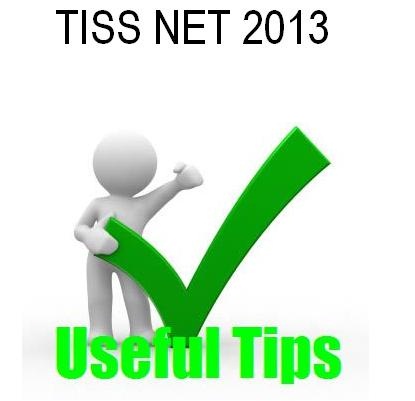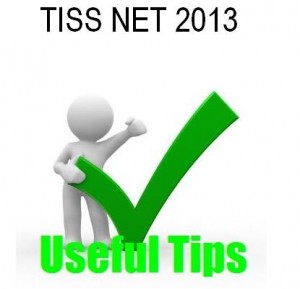
 The (TISSNET) Tata Institute of Social Sciences National Eligibility Test is the entrance test that is conducted by the Tata Institute of Social Sciences (TISS) for admissions in to its Post Graduate Degree Programmes such as M.A., M.Sc., M.H.A. and M.P.H. the Parameters on which the candidate is assessed on are similar to the assessments of management entrances. The test is conducted in 2 parts. The First Part is further divided into 3 sections A. Analytical and Numerical Ability, B. Language Ability and C. Awareness of General and Social Issues while part 2 is sub divided into 4 sections namely Data Interpretation, Data Sufficiency, Reading Comprehension, Business Knowledge and Foundation of Management. Part 1 tests the applicant on their Analytical and Numerical Ability, Language Ability and Awareness of General and Social Issues and Part 2 Tests the applicant on Data Interpretation, Data Sufficiency, Reading Comprehension, Business Knowledge and Foundation of Management. The exam brings with it the age old excitement as well as a new sense of anxiety as students prepare to face the TISSNET. Students usually look for tips that can aid them in their exam preparation; naturally the points that will be covered are based on the parameters that have been mentioned earlier on.
The (TISSNET) Tata Institute of Social Sciences National Eligibility Test is the entrance test that is conducted by the Tata Institute of Social Sciences (TISS) for admissions in to its Post Graduate Degree Programmes such as M.A., M.Sc., M.H.A. and M.P.H. the Parameters on which the candidate is assessed on are similar to the assessments of management entrances. The test is conducted in 2 parts. The First Part is further divided into 3 sections A. Analytical and Numerical Ability, B. Language Ability and C. Awareness of General and Social Issues while part 2 is sub divided into 4 sections namely Data Interpretation, Data Sufficiency, Reading Comprehension, Business Knowledge and Foundation of Management. Part 1 tests the applicant on their Analytical and Numerical Ability, Language Ability and Awareness of General and Social Issues and Part 2 Tests the applicant on Data Interpretation, Data Sufficiency, Reading Comprehension, Business Knowledge and Foundation of Management. The exam brings with it the age old excitement as well as a new sense of anxiety as students prepare to face the TISSNET. Students usually look for tips that can aid them in their exam preparation; naturally the points that will be covered are based on the parameters that have been mentioned earlier on.
Tip 1. Language Ability: the language ability section in TISSNET tests the candidates command over the English language. The questions comprise of analogies, synonyms and antonyms, match the list, idioms, one word for many, fill in the blanks and identifying the various Figures of Speech, therefore students should prepare accordingly.
-
Grammar: A useful tool to improve your language skills is by referring to ‘Wren & Martin’. This book is a perfect guide for improving your grammar, essay writing skills as well as your comprehension skills because it has exercises and examples for each topic. It also comes with a ‘key’ that you can use to verify if your answers are correct.
-
Reading and Comprehension: you can refer to a copy of the ‘Wren & Martin’ as it has very good examples for improving your comprehension skills. It has sample passages that contain questions on most of the aspects covered in the Language section.
-
Expose yourself to the language: if you wish to improve your language skills then you can start by developing a habit of reading. Students stand to benefit from reading because it improves your grammar and also increases your vocabulary. You can start by reading English newspapers, listening to English news and writing a few sentences in English are activities that can definitely help you in the long run. Most importantly converse with a friend who is good at the language if possible, it is the most effective way to increase your confidence. When you come across a word that you do not understand make it a point to open a dictionary and a thesaurus thereafter. So ensure that you have a dictionary and a thesaurus nearby whenever you read something. The table below summarises the points that have been discussed.
| Watch Television in English | Maintain a Note book |
| Watch English Movies with English Soundtracks and English Subtitles | Maintain a Diary |
| Read English Newspapers | Keep a Dictionary Beside you at all times |
| Read English Books | Use a Thesaurus to Improve you Vocabulary |
| Listen to English music and sing along | Do Not Hesitate |
| Practice the 4 core skills | Improve your Grammar |
- Keep a Dictionary and a Thesaurus beside you at all times: you can have them in any form that you are comfortable in, either in print, software or online. When referring to a dictionary and a thesaurus make a note of the things listed below to improve your command over the language and to improve your vocabulary:
-
Note Down the Words or Phrases used with their meanings
Try to use it in a sentence the same day
Look for the Prefixes (un, in) and Suffixes (al, ion, ness)
Explore the verb, noun, adjective or adverb forms
Find Antonyms and Synonyms
Pay attention to the pronunciations of words given beside the word
Access an online dictionary to hear the pronunciation of the word from the speakers
Tip 2. Logical Ability: when a problem is given don’t just solve it try to analyze it for 20 to 30 minutes by asking your W/H questions such as Why, What, When Where and How.
Tip 3. Analytical Reasoning & Decision Making: the reasoning section consists of questions based on logical, analytical and critical reasoning therefore they are framed accordingly. So whenever you read a passage don’t forget to put on your thinking cap and ask your W/ H questions as often as possible. Students need to practice difficult reasoning puzzles from mock papers and books on reasoning. Solving puzzles from popular puzzle books available in bookstores will also help. Focus on lengthy puzzles on distribution involving lots of variables. The section on Decision Making can be best practiced by going through the mock TISSNET papers.
Tip 4. Data Interpretation: this section mainly consists of questions that use bar graphs, line graphs, case lets (data given in the form of paragraphs requires applicants to extract the information provided to establish a relationship between the data given), tables, pie charts or circle graphs etc. to interpret data. Similarly the questions are based on the data that is interpreted, so break up the question and note down the information that is given to you.
Tip 5. General Knowledge: read newspapers and watch educational channels that will boost your general knowledge. A good start to improve your knowledge of India to crack this section is by visiting www.india.gov.in which has information about the latest happenings in the country. Apart from this you can even read past issues of business magazines (from January 2012) and pay attention to the main events in the corporate world. Having information about organizations /associations like the UN and its associate agencies such as ASEAN, SAARC, NATO, BRICS etc. can help you to clear this section. Apart from this information a good knowledge about the stocks and GK questions like countries, capitals, currencies, inventions and discoveries in science can be very helpful.
Tip 6. Group Discussions: try to be loud and aggressive in an appropriate manner, if you need to get your point across. If unclear about the topic wait for someone else to begin. Try and summarize the points that have been discussed at regular intervals.
Tip 7. Practice: it is essential that students refer to previous years question papers and rely on mock tests, as this will make them familiar with the paper pattern and will give them an idea about the type of questions asked. Thus, students are better prepared for the examination.
Tip 8. Join Coaching classes: this will ensure that students practice regularly and are better prepared because they can resolve the queries that they might have about a particular topic.
Tip 9.Health Matters: it is important to ensure that you get enough rest, eat a balanced diet and most importantly exercise. It is important that you sleep in time, eat properly and exercise, if you wish to perform well in the examinations because both the body and the mind need to rest to function to its maximum potential.
Tip 10. Business Knowledge and Foundation of Management:your best source of information is to refer to articles online from e- papers, newsletters, magazines, visit business, real estate and management websites, e-books, in newspapers mainly business and real estate supplements, journals, magazines, listen to business news channels on television, books etc. this will familiarize you to the common terminologies that are used in business and management. These resources will get you familiar with business and management concepts.
The key points that have been covered are highlighted in the table below:
| Language Ability | Group Discussions |
| Logical Ability | Practice |
| Analytical Reasoning & Decision Making | Join Coaching classes |
| Data Interpretation | Health Matters |
| General Knowledge | Business Knowledge and Foundation of Management |
By following these simple tips cracking the TISSNET will be easier to clear. I leave you with a simple quote, “practice as if you are the worst; perform as if you are the best”. If you are looking for more information about the TISSNET exam you can visit our sister website www.way2k.com.

Hey thanks for the tips , they were really helpful!
Hi Mayur,
So glad that it was of some help to you. If you have any quaries you can post them and I will get back to you.
Where can I get more information about the TISSNET exam?
Hi Surabhu,
If you are looking for more information about the TISSNET then you can visit our section on Study and Exam tips for the same or you can visit the officail website for details of the same.
hello sir,
i want more info. about TISS NET syllabus, books to refer, somthing about ground discussions, personl interview and coaching classes if available.
As i am appering next year, i have to prepare good for it.
thank you..
Hi Esther,
Do you know of any coaching classes for the TISSNET?
Thank you so much for the tips for the exams.